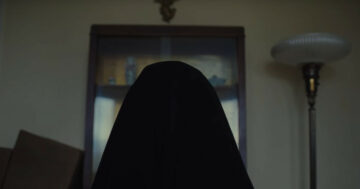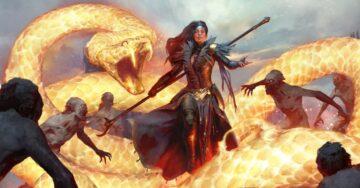There is an entire popular subgenre of films about men who are asleep, and miserable, before they “wake up” and find their metaphorical balls through some major change in their life. Maybe they find out their spouse is cheating on them and their marriage is over, or maybe a child was kidnapped and the police won’t help. What’s important is that the man returns to self-confidence, usually gaining the love of a beautiful woman and the adoration of a side-character who previously bullied them.
There is another popular subgenre of film about fucking with the wrong person, and the consequences of doing so. Ilya Naishuller’s 2021 violence-fantasy Nobody belongs in both buckets, and treats them with same level of reverence. It’s an incredibly skillfully made film. Naishuller excels at delivering action setpieces, and at giving his actors room to react non-verbally, with only time and their darting eyes and body language telling us what they’re feeling, or whether they’re trying to escape or getting ready to act. It’s also probably one of the most morally repugnant films I’ve ever seen.
Nobody’s protagonist isn’t running from someone who’s coming after him. He spends the film fighting and killing people because of a longing to feel skin split open against his knuckles. He does not care whether chasing that experience ends with his own death, or whether his actions put his family into immediate danger.
His actions are for his own benefit, and no one else’s; the violence his decisions bring to those he cares about throughout the film are an after-thought. This is a man whose primary concern is himself, and his needs. This is not a man who cares about others in any real, deep way.
Nobody chronicles a fight he wants, and goes looking for, because he’s realized he only feels alive when he’s hurting other people. If the movie has one message, it’s that his journey into mayhem and murder is going to be just so much fun — for him, and for the audience. Watching Nobody is an absolute joy — there is little more gratifying than seeing someone on the screen be the best at what they do — but that joy is mitigated by the fact that he’s doing what he does best for selfish reasons.
You have to be who you are
Hutch Mansell (Bob Odenkirk, delivering a sincere, committed performance) is dead inside. His wife Becca (Connie Nielsen) tolerates him, at best. His son Blake (Gage Munroe) doesn’t respect him. His young daughter Abby (Paisley Cadorath) thinks he’s just the greatest, and somehow this fact seems to hurt him worst of all. Hutch is sleepwalking through modern domestic life, and he is miserable.
Until two robbers break into his house and steal a tiny bit of cash and his watch. He has the chance to fight back, but he backs down. The police officer who takes his statement clearly believes two things at once: Hutch made the “right” and “safe” choice, but he’s also barely a man. A real man would have fought back. Then Abby says she believes the robbers also took her kitty-cat bracelet. And suddenly, Hutch wakes up.
As with most movies of this type, Hutch secretly had Batman-level talents and connections for investigation and violence all along. It turns out he was once a government “auditor,” a euphemism for a top-secret executioner who showed up when the government didn’t want anyone left alive to complain about a problem. Hutch was the sort of fictional black-ops agent with a completely redacted file. And his job gave him skills at observation that most suburban dads wouldn’t have, skills that told him he didn’t need to resist the robbery: The thieves’ gun was unloaded, and hadn’t been fired in a while.
But after years of suppressing his violent side, Hutch wants to hit, and be hit. He wants broken hands and dead bodies. He might have desired a quiet life at one time, but suburbia is eating away at him like a cancer. The robbers didn’t give him a reason, they gave him an excuse. Tracking them down proves unsatisfying — their poverty and the sick baby they’re supporting mean they aren’t “clean” targets for his rage. And that infuriates him. In his mind, their helplessness doesn’t give him another chance to be a man of peace: It just unfairly robs him of the opportunity to take part in justified violence.
Hutch finally finds catharsis when a group of young Russian men tries to get onto the bus he’s riding home: When he sees they’re drunk, violent, and surrounded by scared potential victims, he prays that they get on, and do what he knows they’re going to do.
What transpires is an epic beatdown with knives, improvised blunt objects, and some of the most painful-looking combat I’ve seen in modern cinema. Hutch dishes out only slightly more pain than he takes, and in one amazing scene, after being thrown out of the bus through a window, he picks himself up from the pile of broken glass, and slowly, painfully, walks back into the bus to keep the fight going. It’s this single-minded approach to fighting, the preternatural ability to absorb damage that makes him such a terrifying opponent. He’s the Terminator, dressed up like your racist uncle.
The bus fight is the literal answer to Hutch’s pleas to the universe: “Deliver me people I can kill, who will hurt me, and I will once again live the life of a chosen man. I will stop pretending to be a man of peace.” When he finds out the young men were connected to the Russian mob, he treats it less like an unintended consequence, and more like a bonus round. The assassins that come to avenge his first set of victims is everything Hutch wanted.
I want to watch the whole world burn
The John Wick films are basically the half-pipe of the action-stunt world, next to series like the Mission: Impossible movies. The story exists to give the creative team freedom to set up incredible action scenes, which are rarely complicated by plot developments or narrative considerations. Everything is an excuse for violence.
In John Wick, the title character (played by Keanu Reeves) goes on a rampage because the bad guys kill his dog, the last gift he has left behind from his dead wife. Everything John does from that point on, everything, is justified by the fact that he’s fighting smug puppy-killers. Screenwriter Derek Kolstad, who also wrote Nobody, bakes the moral reckoning right into the premise.
“The difference is Bob’s character doesn’t need to go back, he wants to,” Naishuller told Inverse. “He’s addicted to violence, to an exciting life. Nobody is a different beast. I know Bob is a different actor from Keanu. Nobody is a deeper film. There’s more happening below the surface.”
It’s no surprise when Hutch learns the robbers didn’t take Abby’s kitty-cat bracelet after all. That doesn’t change a thing. A simpler movie would have used the bracelet as a McGuffin, something that means nothing in the greater world, but gives Hutch a reason to fight for his family. The fact that was just misplaced is a nihilistic joke. Hutch continues to kill because he likes it, and his gradual realization that he’s only at his best when destroying human flesh gives the film a manic energy as the violence keeps escalating, and grows even more cartoonish.
“As the film goes on and Hutch becomes happier, we go to this super-colorful comic book style, where at the end of the movie, the action is supposed to be ridiculous,” Naishuller told Indiewire. “It’s absolutely excessive. There’s no need to kill 50 people. But there is, because that’s what we paid money for. We’re supposed to have a good time. And because finally, Bob’s character is having a good time, I felt we’re allowed to have the dessert of this just ridiculous violence.”
Nobody and John Wick do have a lot in common, given that both are stories about quiet men finding a reason to return to their violent pasts. But Nobody is actually much closer to John Dahl’s 1998 gambling drama Rounders than to any other contemporary film. Rounders tells the story of a young man born to play cards, to read people and take their money. He tries to hide his true nature by going to school to learn law — a profession that also benefits from superior risk management and the ability to read opponents — but he only finds himself again when he leaves his “real life” to chase the next game. Whatever life he chooses in which he isn’t playing cards would be a lie.
Nobody tells the same story, but with death, pain, murder, and fun. This is no moral cover for what Hutch does in this film, outside of the fact that he decides to kill other criminals. His primary target even wants to abandon his criminal career, but Hutch doesn’t want anyone to escape. He wants everyone but his own family locked in that figurative bus, unable to escape his fury. He hurts people because he wants to, and he doesn’t feel like he’s a man unless he’s doing so. If he dies in the process, he knows he’ll die happy, doing what he loved.
Cinema is choked with films about middle-aged men who don’t know how to shake themselves out of the torpor of day-to-day life. Nobody puts a dark spin on that concept by stating that sometimes the best way to find yourself is to destroy others. It’s soaked in the same frustrated male energy as Fight Club: Hutch used to be something close to a superhero for hire, an agent of death. Now he’s being bullied by his brother-in-law. He wants his power back, and he sees killing as a way to get it.
Which is always the lie hiding in the heart of these action movies about middle-aged men finding their souls again. They aren’t dead inside because they lack some external means of imposing their will on others, they’re dead inside because they’re completely checked out of their lives. The reality is that they’re searching, sometimes relentlessly, for an external answer to an internal problem. Hutch’s family doesn’t respect him because there’s nothing there to respect. He’s disappeared into a hole he created for himself, and he’s mad as hell about it.
I’ve heard folks describe Nobody as a parable of repressed male rage, but in what universe is male rage repressed? Male rage permeates our reality, from pop culture to politics. There might not be another emotion so often expressed, or imposed on others. Some people may relate to the desire to hurt others to once again feel masculine. But far more people have stories about being victims of that same male rage. And their rights aren’t trumped by someone else’s longing to feel like a man.
The reality is, Hutch stopped showing up for his own life, and everyone noticed. Who can love, or even respect, a man who fell asleep years ago and doesn’t seem to mind? And why is it fun to see him take out that choice on other people?
Nobody is almost a horror film, told primarily through the claustrophobic point of view of its sociopathic lead character. I’m not sure anyone but Odenkirk could have pulled off this thematic bait-and-switch so well, but the end result is a film that lays bare the calculus of movie violence, and gets uncomfortably close to a question America does not seem to want to answer: What if one regular guy’s happiness isn’t worth a pile of bodies?
Source: https://www.polygon.com/22393939/nobody-review-violence-john-wick-bob-odenkirk
- Absolute
- Action
- america
- audience
- Baby
- BEST
- Bit
- body
- bus
- Cancer
- care
- Career
- Cash
- change
- chase
- child
- Cinema
- closer
- coming
- Common
- Connections
- content
- continues
- Creative
- Criminal
- Criminals
- Culture
- data
- dead
- delivering
- destroy
- Drama
- ends
- energy
- family
- Film
- films
- Finally
- finds
- First
- Freedom
- fun
- Gambling
- game
- gif
- Giving
- good
- Government
- Group
- Hide
- hire
- Home
- House
- How
- How To
- HTTPS
- investigation
- IT
- Job
- knives
- language
- Law
- lead
- LEARN
- Level
- love
- major
- man
- management
- Men
- money
- movie
- Movies
- Officer
- open
- Opportunity
- Other
- Others
- Pain
- People
- performance
- Point of View
- Police
- politics
- Popular
- Poverty
- power
- protagonist
- proves
- React
- Reality
- reasons
- returns
- Risk
- risk management
- running
- School
- Screen
- sees
- Series
- set
- skills
- Skin
- So
- son
- Spin
- split
- Statement
- Stories
- superhero
- Surface
- surprise
- talents
- Target
- tells
- time
- Tracking
- treats
- Universal
- us
- View
- Watch
- WHO
- win
- woman
- world
- worth
- years
- youtube










